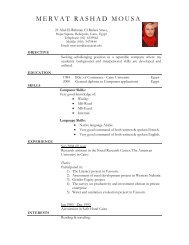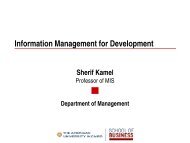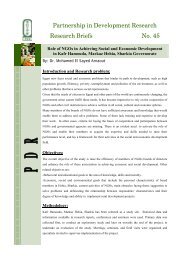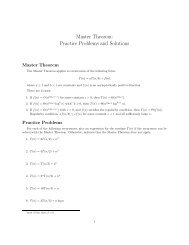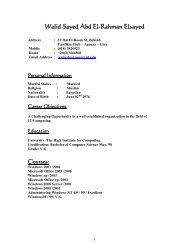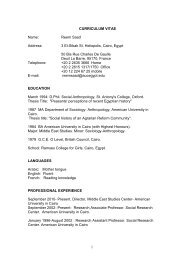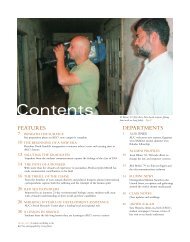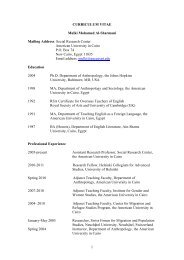computer mediated communication for learning and teaching
computer mediated communication for learning and teaching
computer mediated communication for learning and teaching
You also want an ePaper? Increase the reach of your titles
YUMPU automatically turns print PDFs into web optimized ePapers that Google loves.
adaptability to change, speed of <strong>communication</strong>, the ability to reach large audiences, instant feedback,<br />
facilitation of group work, <strong>and</strong> cost savings [15] [28]. On the other h<strong>and</strong>, a significant literature,<br />
particularly amongst academic psychologists questions the expense <strong>and</strong> purpose of developing <strong>computer</strong>based<br />
<strong>learning</strong>. Some question whether the potential increment in student <strong>learning</strong> is worth the time <strong>and</strong><br />
trouble involved. Many authors have anecdotally discussed some of the shortcomings <strong>and</strong> obstacles of<br />
embracing the Internet in higher education settings. Such problems include lack of privacy issues, poor or<br />
limited interactions, technological difficulties (e.g., server failure, overloaded circuits, "dead" links),<br />
software limitations, increased time commitment (of faculty), limited faculty knowledge, training <strong>and</strong><br />
support, technological rather than content focus, isolation, <strong>and</strong> archival/retrieval concerns [9] [17] [33].<br />
Does <strong>computer</strong> technology simply allow us to achieve old goals more efficiently? Or can (should) it be<br />
used in a self-conscious manner to construct a social environment with a new morphology of<br />
interpersonal <strong>communication</strong>? The historically conditioned <strong>for</strong>ms of activity <strong>mediated</strong> through <strong>computer</strong>s<br />
must be studied <strong>for</strong> the qualitatively distinctive <strong>for</strong>ms of interaction that these artefacts af<strong>for</strong>d <strong>and</strong> the<br />
social arrangements that they help to constitute. One needs to consider the ‘effects’ of interacting in this<br />
medium in the entire system of social relations of which they are a part [31]. All of which begs the<br />
question: What are the strengths <strong>and</strong> weaknesses of <strong>computer</strong>-<strong>mediated</strong>-<strong>communication</strong>?<br />
3. STRENGTHS AND WEAKNESSES OF COMPUTER-MEDIATED-<br />
COMMUNICATION<br />
3.1 Strengths<br />
• The ability to think, study, participate <strong>and</strong> initiate conversation without the restrictions of time or<br />
place [4] [23].<br />
• The ability <strong>for</strong> reflection <strong>and</strong> thoughtful, asynchronous negotiation of meaning between members of<br />
a large group [7] [21]. This potential <strong>for</strong> collaboration is what connects <strong>computer</strong>-<strong>mediated</strong><strong>communication</strong><br />
to constructivist pedagogy [20].<br />
• Conversations may be archived <strong>for</strong> future reference including the ability to re-visit the full context of<br />
a topic [23].<br />
• The potential exists <strong>for</strong> greater equality of participation within the group given the reduction in<br />
recognisable, economic, social, <strong>and</strong> racial or gender distinction [11].<br />
3.2 Weaknesses<br />
• The ubiquitous complaint about lack of face-to-face contact, resulting in the loss of phatic functions<br />
that provide reassurance to both the speaker <strong>and</strong> listener [12].<br />
• Most of the messages are instructive rather than constructive or collaborative. This is probably not a<br />
weakness so much as a hurdle that must be leaped by all in the interest of "community".<br />
• Although electronic <strong>for</strong>a efficiently link those in need of in<strong>for</strong>mation with those that have it [8], the<br />
lack of sustained high-quality participation in <strong>for</strong>a discussion has been examined <strong>and</strong> seen to be a<br />
regularised phenomenon [34]. The "experience" [7], buttressed by personal involvement, is that there<br />
is no "rational" [13] [23] reason <strong>for</strong> someone to participate when they can "free ride" <strong>and</strong> enjoy the<br />
contributions of others, unless they have some altruistic concern about the survival of the <strong>for</strong>um. The<br />
relevant prediction is that message contributions will be generally undersupplied in all <strong>for</strong>a [29].<br />
There<strong>for</strong>e, both intuitively <strong>and</strong> experientially, “lurking” should come as no surprise.<br />
4. FURTHER REFLECTIONS ON MEDIATED COMMUNICATION


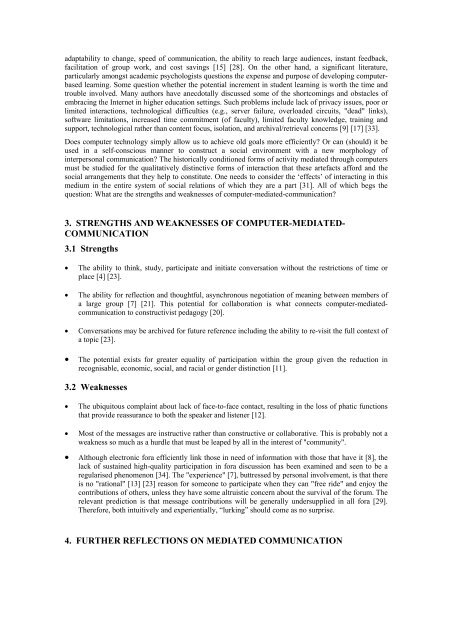
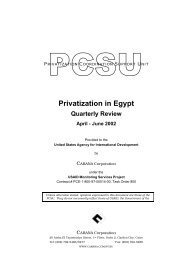
![Download entire catalog in pdf format [1.5MB] - The American ...](https://img.yumpu.com/51079239/1/190x260/download-entire-catalog-in-pdf-format-15mb-the-american-.jpg?quality=85)


